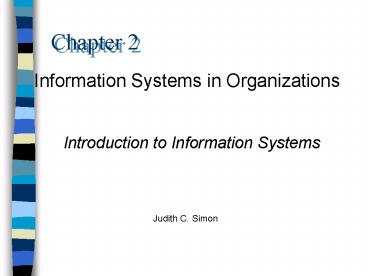Simon Text Book - PowerPoint PPT Presentation
1 / 18
Title:
Simon Text Book
Description:
Transactions of mail-order purchases via credit card. Online Processing ... Invalid credit card numbers are checked by clerks. Information Reporting System ... – PowerPoint PPT presentation
Number of Views:22
Avg rating:3.0/5.0
Title: Simon Text Book
1
Chapter 2
Information Systems in Organizations
Introduction to Information Systems
Judith C. Simon
2
Chapter 2 Major Topics
- Common types of information systems
- Strategic and other managerial uses of
information systems - Strategic decisions related to information
systems - Functional uses of information systems
- New concerns because of information technology
3
Transaction Processing System (TPS)
- Transaction some business activity, such as the
sale of a product or service - TPS was one of the first types of business
information systems to be developed - TPS maintains records of business transactions
and analyzes the data to provide desired output
4
Transaction Processing Systems
5
Batch Processing
Transactions of mail-order purchases via credit
card
1
2
3
4
5
6
All transactions will be checked as a group
without human interaction.
6
Online Processing
Invalid credit card numbers are checked by clerks
These transactions require human interaction.
7
Information Reporting System
- One of the first forms of management information
system - Developed initially to provide reports to
management based on transaction processing
systems - Examples of reports inventory quantities
available for each product, processing costs,
product sales per produce or per sales
representative, exception reports
8
Information Reporting Systems
9
Management Levels and Decision Types
- Top management
- Makes strategic decisions does long-term
planning typically uses more external data than
other levels - Middle management
- Makes tactical decisions does shorter-term
planning than top management converts top
management desires into action plans - Lower management
- Makes operational decisions uses more detailed
internal data than other levels has more
structured decisions than other levels
10
Managerial Uses of Information
Top Management Strategic Decisions
Middle Management Tactical Decisions
Lower Management Operational Decisions
Information systems provide managers at different
levels with decision-making information.
11
Functional Uses of IS - Examples
- Human resources IS handles pre-employment
activities and employee data - Accounting/Financial IS maintains transaction
records, e.g., for receivables and payables, as
well as data for budgeting and financial planning
- Marketing/Sales IS used for such activities as
advertising decisions, order management, trends
analysis - Production/Operations IS handles creation of
products and services and methods of providing
these items to others
12
Cross-Functional Relationships
- Cross-functional relationships have become a
major part of IS developments, with multiple
functions working together to produce the best
result - Supply chain sequence of processes and partners
that deliver products and services to a customer - Demand chain handling customer product or
service demands - Value chain entire process from initial demand
through supplying of product or service
13
Global Concerns
- Businesses today must expect work and trade to
occur around the world and around the clock and
must plan and make strategic decisions
accordingly - Businesses must be knowledgeable about technology
issues in working with other countries to
determine the best combinations of locations - Local businesses must realize that they are are
competing globally even if they do not have
physical facilities in other countries
14
A Global Concern is ...
Businesses can now compete with your organization
worldwide regardless of their home location.
15
Ethical Issues
- Business ethics refers to professional standards
of conduct. - Ethical issues include
- Privacy, primarily concerned with keeping
confidential data confidential - Security, including protection of data, hardware,
and software - Accuracy, ensuring that data cannot be changed
without authorization - Ownership, also referred to as intellectual
property, identifying clearly who has the rights
to items developed and protecting those rights
16
An Ethical Concern is ...
Technologys rapid developments have outpaced the
creation of laws and guidelines for appropriate
behavior in using and developing the technology.
17
Social Issues
- Social issues are related to maintaining or
improving the quality of life. - Social issues related to computer use include
- working conditions
- education
- environmental protection
- health care
- public transportation
18
A Social Concern is ...
Technology can increase the capability of
studying social issues but can also cause new
issues to arise, such as waste of natural
resources.












![READ [PDF] A Funny Thing Happened on the Way to the Forum (Applause Librett PowerPoint PPT Presentation](https://s3.amazonaws.com/images.powershow.com/10046139.th0.jpg?_=20240603065)


![❤[READ]❤ Why We Need Love (Harperperennial Modern Thought) PowerPoint PPT Presentation](https://s3.amazonaws.com/images.powershow.com/10047331.th0.jpg?_=20240604102)









![Download [PDF] Fatherland (Modern Plays) PowerPoint PPT Presentation](https://s3.amazonaws.com/images.powershow.com/10091835.th0.jpg?_=20240803019)





